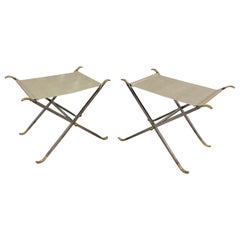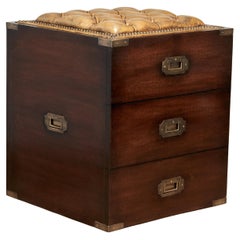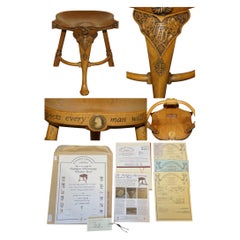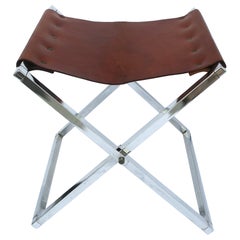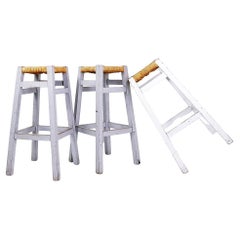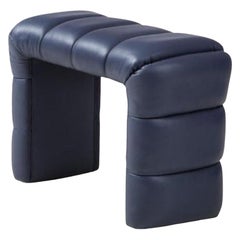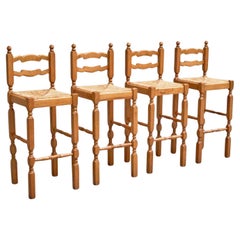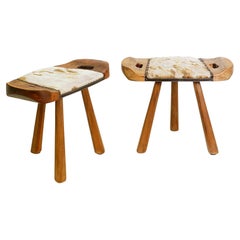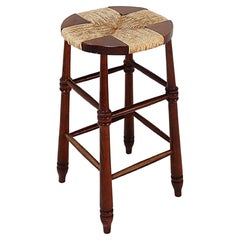Campaign Stools
Sometimes called “knock-down” furniture, campaign furniture was designed to be folded, collapsed, taken apart and packed flat to load onto a ship or a camel’s back. Although mobile furniture for military campaigns dates back to the Romans, the British Army in its global conquests in the 18th and 19th centuries defined the style with sturdy and elegant pieces. Even in a tent thousands of miles from London, a four-poster bed, dining table and seating could simulate the comforts of home.
Antique and vintage campaign-style furniture was also initially designed as propaganda. The mahogany and teak structures were part of a purposeful demonstration of power in these campaigns, with the colonizing military officers imposing their culture and view of what they considered “civilized” on a given land and its peoples. Designers and manufacturers including Thomas Butler, Ross & Co. of Dublin, and Morgan & Sanders contributed to the rapid production of this furniture as the British Empire expanded through Africa, Asia and Australia.
Campaign furniture was utilitarian as well as refined, fitted with recessed brass handles and brass angles on stackable chests and other case pieces to protect vulnerable corners. The Wellington chest was one of the most famous pieces to come out of this style, named for the Duke of Wellington, who slept in his campaign bed long after his battles were over.
The flexibility of campaign-style furniture would influence 20th-century Scandinavian modernists such as Kaare Klint, Mogens Koch and Arne Norell. For his 1930s Safari chair, Klint drew on the simple Roorkhee chair, named for a town in northern India. The lightweight and adaptable campaign-style seat was created in the late 19th century and had no fixed joinery. The Roorkhee’s influence can also be seen in the Wassily chair, a pared-down work of tubular metal and durable canvas conceived by legendary Bauhaus instructor Marcel Breuer.
Now, 21st-century designers like Jomo Tariku and Dokter and Misses are creating pieces that recognize the contributions of African artisans to campaign furniture in order to reframe this style without overlooking its difficult past.
Find a collection of authentic antique and vintage campaign bedroom furniture, chairs, decorative objects and other pieces on 1stDibs.
20th Century Italian Campaign Stools
Brass, Steel
20th Century English Campaign Stools
Brass
20th Century English Campaign Stools
Copper
Late 20th Century Campaign Stools
Chrome
20th Century Campaign Stools
Rush, Wood
21st Century and Contemporary Italian Campaign Stools
Leather, Wood
Mid-20th Century European Campaign Stools
Rush, Oak
1950s Japanese Vintage Campaign Stools
Metal
1940s American Vintage Campaign Stools
Aluminum
1960s American Vintage Campaign Stools
Metal
Late 20th Century American Campaign Stools
Steel
Late 20th Century American Campaign Stools
Metal
1970s Swedish Vintage Campaign Stools
Mahogany
Mid-19th Century French Antique Campaign Stools
Cane, Fruitwood
20th Century Italian Campaign Stools
Steel
Mid-18th Century Antique Campaign Stools
Walnut
21st Century and Contemporary English Campaign Stools
Leather, Wood
20th Century Campaign Stools
Cowhide, Wood
20th Century Campaign Stools
Wood
20th Century American Campaign Stools
Brass
1960s French Vintage Campaign Stools
Oak
1980s Philippine Vintage Campaign Stools
Brass
1980s Philippine Vintage Campaign Stools
Brass
Early 20th Century French Campaign Stools
Brass, Steel
Mid-20th Century English Campaign Stools
Brass
Late 19th Century English Antique Campaign Stools
Canvas, Fruitwood
21st Century and Contemporary Campaign Stools
Brass
Late 20th Century Campaign Stools
Brass
1950s French Vintage Campaign Stools
Wood
